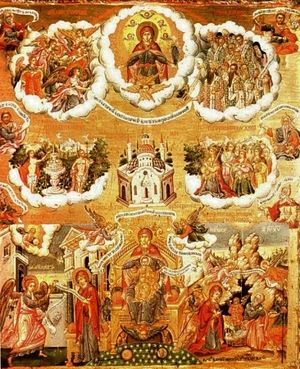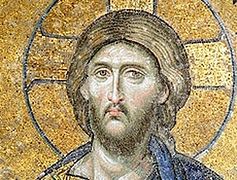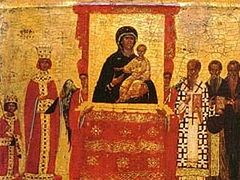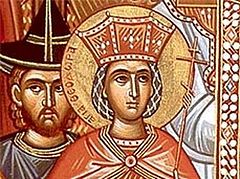Rejoicing today in the triumph of Orthodoxy on this first Sunday of Lent, we joyfully commemorate three events: one event belonging to the past; one event to the present; and one event which still belongs to the future.

Rejoicing today in the triumph of Orthodoxy on this first Sunday of Lent, we joyfully commemorate three events: one event belonging to the past; one event to the present; and one event which still belongs to the future.
Whenever we have any feast or joy in the Church, we Orthodox first of all look back — for in our present life we depend on what happened in the past. We depend first of all, of course, on the first and the ultimate triumph—that of Christ Himself. Our faith is rooted in that strange defeat which became the most glorious victory — the defeat of a man nailed to the cross, who rose again from the dead, who is the Lord and the Master of the world. This is the first triumph of Orthodoxy. This is the content of all our commemorations and of all our joy. This man selected and chose twelve men, gave them power to preach about that defeat and that victory, and sent them to the whole world saying preach and baptize, build up the Church, announce the Kingdom of God. And you know, my brothers and sisters, how those twelve men — very simple men indeed, simple fishermen — went out and preached. The world hated them, the Roman Empire persecuted them, and they were covered with blood. But that blood was another victory. The Church grew, the Church covered the universe with the true faith. After 300 years of the most unequal conflict between the powerful Roman Empire and the powerless Christian Church, the Roman Empire accepted Christ as Lord and Master. That was the second triumph of Orthodoxy. The Roman Empire recognized the one whom it crucified and those whom it persecuted as the bearers of truth, and their teaching as the teaching of life eternal. The Church triumphed. But then the second period of troubles began.
The following centuries saw many attempts to distort the faith, to adjust it to human needs, to fill it with human content. In each generation there were those who could not accept that message of the cross and resurrection and life eternal. They tried to change it, and those changes we call heresies. Again there were persecutions. Again, Orthodox bishops, monks and laymen defended their faith and were condemned and went into exile and were covered with blood. And after five centuries of those conflicts and persecutions and discussions, the day came which we commemorate today, the day of the final victory of Orthodoxy as the true faith over all the heresies. It happened on the first Sunday of Lent in the year 843 in Constantinople. After almost 100 years of persecution directed against the worship of the holy icons, the Church finally proclaimed that the truth had been defined, that the truth was fully in the possession of the Church. And since then all Orthodox people, wherever they live, have gathered on this Sunday to proclaim before the world their faith in that truth, their belief that their Church is truly apostolic, truly Orthodox, truly universal. This is the event of the past that we commemorate today.
But let us ask ourselves one question: Do all the triumphs of Orthodoxy, all the victories, belong to the past? Looking at the present today, we sometimes feel that our only consolation is to remember the past. Then Orthodoxy was glorious, then the Orthodox Church was powerful, then it dominated. But what about the present? My dear friends, if the triumph of Orthodoxy belongs to the past only, if there is nothing else for us to do but commemorate, to repeat to ourselves how glorious was the past, then Orthodoxy is dead. But we are here tonight to witness to the fact that Orthodoxy not only is not dead but also that it is once more and forever celebrating its own triumph — the triumph of Orthodoxy. We don’t have to fight heresies among ourselves, but we have other things that once more challenge our Orthodox faith.
Today, gathered here together, Orthodox of various national backgrounds, we proclaim and we glorify first of all our unity in Orthodoxy. This is the triumph of Orthodoxy in the present. This is a most wonderful event: that all of us, with all our differences, with all our limitations, with all our weaknesses, can come together and say we belong to that Orthodox faith, that we are one in Christ and in Orthodoxy. We are living very far from the traditional centers of Orthodoxy. We call ourselves Eastern Orthodox, and yet we are here in the West, so far from those glorious cities which were centers of the Orthodox faith for centuries — Constantinople, Alexandria, Antioch, Jerusalem, Moscow. How far are those cities. And yet, don’t we have the feeling that something of a miracle has happened, that God has sent us here, far into the West, not just in order to settle here, to increase our income, to build up a community. He also has sent us as apostles of Orthodoxy, so that this faith, which historically was limited to the East, now is becoming a faith which is truly and completely universal.
This is a thrilling moment in the history of Orthodoxy. That is why it is so important for us to be here tonight and to understand, to realize, to have that vision of what is going on. People were crossing the ocean, coming here, not thinking so much about their faith as about themselves, about their lives, about their future. They were usually poor people, they had a difficult life, and they built those little Orthodox churches everywhere in America not for other people but for themselves, just to remember their homes, to perpetuate their tradition. They didn’t think of the future. And yet this is what happened: the Orthodox Church was sent here through and with those poor men. The truth itself, the fullness of the apostolic faith—all this came here, and here we are now, filling this hall and proclaiming this apostolic faith — the faith that has strengthened the universe. And this leads us to the event which still belongs to the future.
If today we can only proclaim, if we can only pray for that coming triumph of Orthodoxy in this country and in the world, our Orthodox faith forces us to believe that it is not by accident but by divine providence that the Orthodox faith today has reached all countries, all cities, all continents of the universe. After that historic weakness of our religion, after the persecutions by the Roman Empire, by the Turks, by the godless atheists, after all the troubles that we had to go through, today a new day begins. Something new is going to happen. And it is this future of Orthodoxy that we have to rejoice about today.
We can already have a vision of that future when, in the West, a strong American Orthodox Church comes into existence. We can see how this faith, which for such a long time was an alien faith here, will become truly and completely universal in the sense that we will answer the questions of all men, and also all their questions. For if we believe in that word: “Orthodoxy,” “the true faith”; if for one moment we try to understand what it means: the true, the full Christianity, as it has been proclaimed by Christ and His disciples; if our Church has preserved for all ages the message of the apostles and of the fathers and of the saints in its purest form, then, my dear friends, here is the answer to the questions and to the problems and to the sufferings of our world. You know that our world today is so complex. It is changing all the time. And the more it changes, the more people fear, the more they are frightened by the future, the morethey are preoccupied by what will happen to them. And this is where Orthodoxy must answer their problem; this is where Orthodoxy must accept the challenge of modern civilization and reveal to men of all nations, to all men in the whole world, that it has remained the force of God left in history for the transformation, for the deification, for the transfiguration of human life.

Today this responsibility belongs to us. We feel that we are weak. We feel that we are limited, we are divided, we are still separated in so many groups, we have so many obstacles to overcome. But today, on the Sunday of Orthodoxy, we close our eyes for a second and we rejoice in that unity which is already here: priests of various national churches praying together, people of all backgrounds uniting in prayer for the triumph of Orthodoxy. We are already in a triumph, and may God help us keep that triumph in our hearts, so that we never give up hope in that future event in the history of orthodoxy when Orthodoxy will become the victory which eternally overcomes all the obstacles, because that victory is the victory of Christ Himself.
As we approach the most important moment of the Eucharist, the priest says, “Let us love one another, that with one mind we may confess….” What is the condition of the real triumph of Orthodoxy? What is the way leading to the real, the final, the ultimate victory of our faith? The answer comes from the Gospel. The answer comes from Christ Himself and from the whole tradition of Orthodoxy. It is love. Let us love one another, that with one mind we may confess . . . confess our faith, our Orthodoxy. Let us, from now on, feel responsible for each other. Let us understand that even if we are divided in small parishes, in small dioceses, we first of all belong to one another. We belong together, to Christ, to His Body, to the Church. Let us feel responsible for each other, and let us love one another. Let us put above everything else the interests of Orthodoxy in this country. Let us understand that each one of us today has to be the apostle of Orthodoxy in a country which is not yet Orthodox, in a society which is asking us: “What do you believe?” “What is your faith?” And let us, above everything else, keep the memory, keep the experience, keep the taste of that unity which we are anticipating tonight.
At the end of the first century — when the Church was still a very small group, a very small minority, in a society which was definitely anti-Christian when the persecution was beginning — St. John the Divine, the beloved disciple of Christ, wrote these words: “And this is the victory, our faith, this is the victory.” There was no victory at that time, and yet he knew that in his faith he had the victory that can be applied to us today. We have the promise of Christ, that the gates of hell will never prevail against the Church. We have the promise of Christ that if we have faith, all things are possible. We have the promise of the Holy Spirit, that He will fill all that which is weak, that He will help us at the moment when we need help. In other words, we have all the possibilities, we have everything that we need, and therefore the victory is ours. It is not a human victory which can be defined in terms of money, of human success, of human achievements. What we are preaching tonight, what we are proclaiming tonight, what we are praying for tonight, is the victory of Christ in me, in us, in all of you in the Orthodox Church in America. And that victory of Christ in us, of the one who for us was crucified and rose again from the dead, that victory will be the victory of His Church.
Today is the triumph of Orthodoxy, and a hymn sung today states solemnly and simply: “This is the Apostolic faith, this is the Orthodox faith, this is the faith of the Fathers, this is the faith that is the foundation of the world.” My dear brothers and sisters, this is also our own faith. We are chosen. We are elected. We are the happy few that can say of our faith, “apostolic,” “universal,” “the faith of our fathers,” “Orthodoxy,” “the truth.” Having this wonderful treasure, let us preserve it, let us keep it, and let us also use it in such a way that this treasure becomes the victory of Christ in us and in His Church. Amen.




